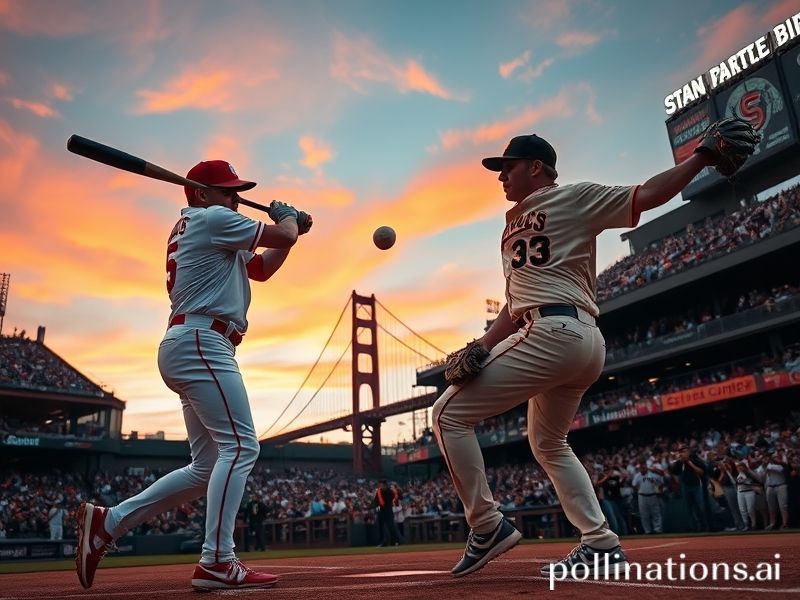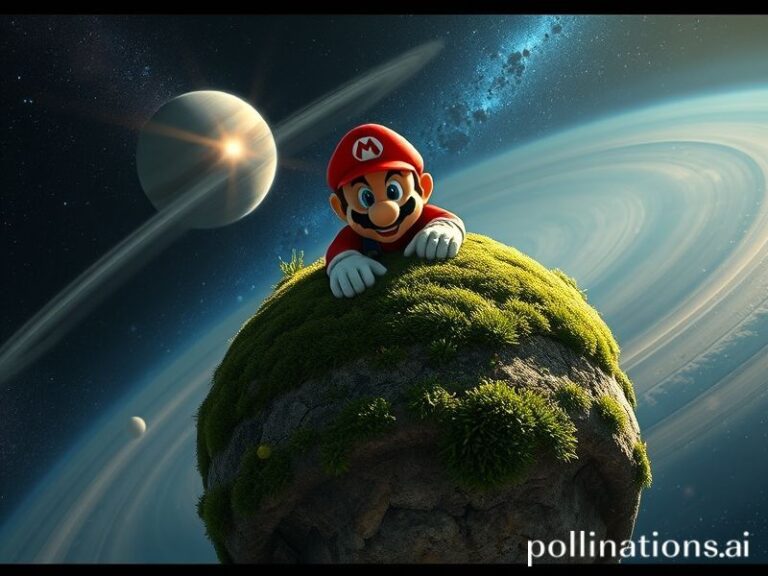Red Birds, Orange Fog: How a Cardinals-Giants Snoozer Became the Planet’s Latest Shared Delusion
The Red and the Orange: A Global Reckoning in St. Louis
(Dave’s Locker, International Desk – somewhere between purgatory and a press-box buffet)
By the time the first pitch left Miles Mikolas’s hand Monday night, the planet had already endured another rotation of existential dread. In Kyiv, air-raid sirens competed with Champions League highlights; in Lagos, commuters haggled over diesel prices while scrolling box scores; and somewhere over the Pacific, a software engineer on a 14-hour United flight toggled between live flight-tracking and a pixelated stream of Busch Stadium because, apparently, we all now choose our own apocalypse soundtrack. Cardinals versus Giants, then, was never just baseball—it was the latest episode of humanity’s longest-running tragicomedy, performed in red piping and Halloween-orange trim.
Let’s dispense with the obvious: St. Louis is landlocked, and San Francisco keeps threatening to detach itself into the sea like a moody teenager slamming the door on continental America. Yet these two franchises have spent 140-odd years exporting their neuroses well beyond U.S. borders. The Cardinals—self-styled “best fans in baseball”—sell more merch in Panama and South Korea than any other National League club, proving that Midwestern politeness scales remarkably well as long as it’s stitched onto a polyester bird. Meanwhile, the Giants, flush with Silicon Valley cash, pioneered the use of analytics to monetize every foul ball; somewhere in Zurich, a quant fund manager just bought a stake in a startup that claims to arbitrage Brandon Crawford’s BABIP fluctuations against the Swiss franc. Capitalism, like a hungover closer, never leaves the mound quietly.
On the field, this particular three-game set mattered only marginally more than a UN climate resolution—binding until the next election cycle. The Cardinals arrived clinging to the last wild-card life raft, a franchise tradition roughly as reliable as a Russian cease-fire. The Giants, equally mediocre but 2.8 million TikTok followers richer, were busy auditioning for October relevance while privately praying that Logan Webb’s elbow ligaments hold up better than global supply chains. The first night ended 3-2, St. Louis, on a Nolan Arenado flare that landed with the gentle inevitability of an IMF austerity package: nobody thrilled, everyone vaguely relieved.
The international implications? Subtle, but everywhere. Consider the Dominican winter-league pipeline: the winning pitcher, a 23-year-old rookie from San Pedro de Macorís, will send half his per-diem to a grandmother who still cooks with propane because the national grid flickers like a Mets bullpen. In Seoul, a conglomerate vice-president wakes at 5 a.m. to watch Adam Wainwright throw 84-mph eephus pitches and wonders why his own country’s conglomerates can’t master such graceful obsolescence. And in London, where MLB will next season force-feed Europeans nine innings of “extra-inning runner-on-second” excitement, pub patrons already grumble that cricket was at least honest about its colonial intent.
Back in Missouri, the stadium organ wheezed out Sinatra—because nothing says timeless Americana like a crooner who died when disco was young. The crowd did the wave, a human semaphore that translates roughly to “We have nothing left to believe in, but at least we can synchronize our despair.” Between innings, the scoreboard urged fans to vote for the All-Star Game, a process now as transparent as a North Korean election but with better bobbleheads. By the ninth, when Giovanny Gallegos struck out Joc Pederson on a slider that broke sharper than German coalition talks, the applause felt less like joy and more like a contractual obligation—renewable, like student debt.
Baseball, that pastoral lie we tell ourselves about summer and fairness, keeps touring the globe because it’s portable mythology. The Cardinals and Giants will finish third or fourth, give or take a COVID outbreak, and the world will keep spinning toward whatever fresh catastrophe awaits. But for three nights in the Midwest, two underachieving ball clubs offered 36,000 strangers a shared delusion: that outcomes can still be decided by wooden sticks and leather spheres instead of algorithms and hypersonic missiles. The final score, as always, is temporary; the ticket stubs, like expired passports, will yellow in drawers from Manila to Montevideo, reminders that we once paid good money to pretend the end wasn’t nigh.
Play ball. Or don’t. History’s box score remains hilariously unforgiving.







